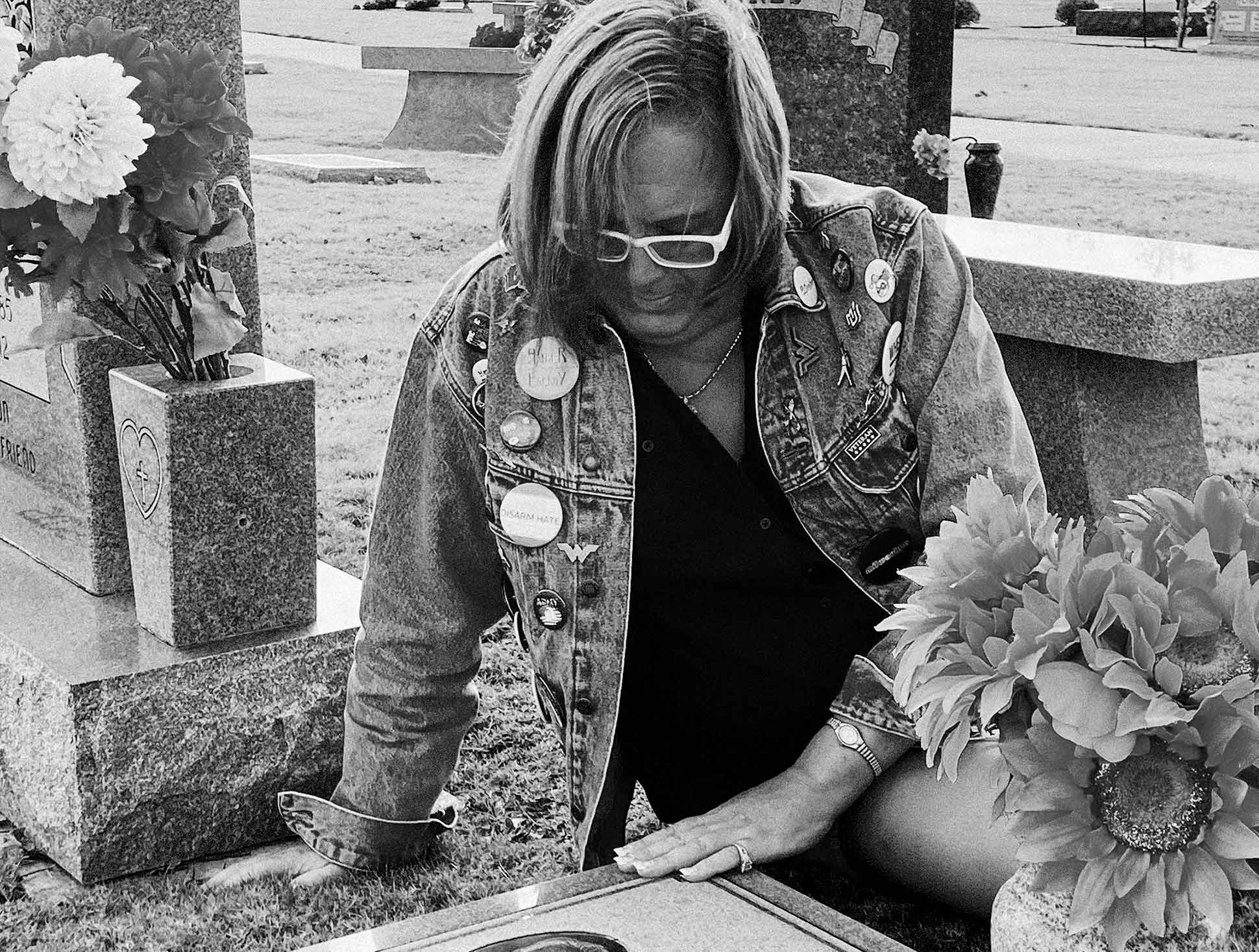Two beams of light are shooting toward Amber Lynn Meyer.
Her hair is pulled out of her face, her body crunched toward the handlebars of her red Santa Fe bicycle for this morning ride in March 2020. From the oncoming lane, a driver speeds toward Amber across a double-yellow line. Caught in the headlights, Amber jerks the handlebars as hard as she can, and the front tire jackknifes, dumping her on the ground. When her body meets the pavement, five ribs on her right side break.
Nobody is around to help her, and the few cars out before 5 a.m. do not stop. The car that tried to hit her is long gone. Amber pushes her bloodied, gritty body off the pavement and walks her bike the rest of the way to her apartment. Winded and unable to lift her arms, the 56-year-old somehow carries the bike up three flights of stairs to her unit.
She needs to go to a hospital. The Veterans Affairs (VA) emergency room is two trains and 15 stops away. Amber leaves her apartment, hugging the railing as she hobbles down the stairs, past the rows of carports lining the buildings in her Dallas, Texas, neighbourhood. Up her street there is a shopping centre, a dumpster with a regular crowd of people around it and a gauntlet of men outside a corner store waiting to be picked up for daywork. They always laugh and point as she walks by, but the shortest path to Park Lane Station is in front of them, through a parking lot where she was mugged at gunpoint years back.
“Shut your fucking mouth,” Amber often tells them.
On the train, there is no room for her to sit. Later on this day, Dallas County officials will report the area’s first cases of COVID-19, and lockdown orders are still days away. Amber grabs onto a rail and stands in the doorway, fighting through lightheadedness not to pass out. The second train moves through a tunnel, Amber holds her bones together as the car bounces and scoots across Dallas, and the car turns dark.
As a trans military veteran, Amber is sometimes apprehensive about trips to the VA. The thought of them can send beads of sweat skidding down her forehead. Each visit, she walks past men staring from under their camouflage ball caps emblazoned with old division numbers and insignias and married women pushing their husbands to the next appointment.
She enlisted in the Army in 1987 to affirm the masculinity her male body imposed on her. From as young as six, Amber remembers dressing in women’s clothes. She also remembers the yelling and tension it caused at home, always feeling like a letdown to her parents. After her family moved to El Paso, Texas, during her sophomore year, her desires to dress in women’s clothing grew. One time she snuck into a friend’s home and tried on their mother’s clothing while they were gone. The family came home early, found then-teenaged Amber and chased her down the street. To become a soldier would give purpose to her otherwise disorienting life—but it would also set her back.
Amber spends nearly a week in March 2020 at the VA hospital, and later at Parkland Hospital, before doctors release her. She files an incident report with the Dallas Police Department that goes nowhere, because, she figures, she has no solid description of the vehicle that hit her bike and no plate number. Amber returns to her apartment to heal, joining millions of people who are now quarantined at home.

Credit: Courtesy Amber Lynn Meyer
There, 400 pairs of heels decorate the wall of her dining area on a rack she made using two old wooden ladders. On the wall behind her TV are keepsakes from her favourite sports teams from Wisconsin. The letter A is framed throughout the unit. Six moving boxes filled with second-hand purses sit in her living room next to her sofa. Framed Wonder Woman logos in various colour schemes are scattered on multiple walls throughout her unit.
It’s May before Amber’s ribs are fully healed. She watches the news and scrolls her phone, keeping up with the pandemic as it worsens. Donald Trump continues his crocodile spin toward a tense election defeat. Trans women are killed across the United States in what will become the deadliest year for the community on record.
A tank mechanic who served in combat during the Gulf War in 1991, Amber has war flashbacks. But Scud missiles and machine gun sniper rounds are not what fly through her nightmares. During boot camp in 1987 at Fort Leonard Wood in Missouri, fellow recruits physically beat Amber as she lay on a rack inside the barracks. She tried to conceal her femininity by wrapping herself in a masculine culture, but the young soldiers caught on. They struck her over and over with pillow cases filled with bars of soap, calling her homophobic slurs and threatening her. She told none of her commanding officers. Her military experience would forever be strained.
“I close my eyes, I hear wailing,” Amber says.
Four years under president Trump intensified the negative associations Amber has with the military. In 2019, the Trump administration outright banned trans people from serving in the American military, an agonizing reminder of the violence and repression she endured during her Army years that would later destabilize her life. The ban was in place for more than a year, before being reversed by Joe Biden’s administration in 2021.
The year 2020 gives Amber time to dissect her life—maybe too much time. Before the pandemic, she found plenty of activities to distract herself from the bad memories. But with Dallas in lockdown, all Amber has is time to think. The more she thinks, the physically weaker she becomes.
One night Amber is lying down flipping through channels on the TV when her vision in her left eye becomes blurry. Doctors at the VA diagnose Amber with conversion disorder and tell her that, in general, the stress in her life has caused diplopia, or double vision. They tell her to make an effort to stay calm, to think positively. But Amber toils with her place in the world, the weight of her memories obscuring her view.
There are no remedies for Amber’s double vision. Doctors tell her she can only wait for the issue to dissipate. She mostly piddles at home. Not many places are open during the pandemic, but Amber still has to buy groceries and run errands. As if the world outside her apartment was not already dangerous enough, she now has to walk around with her head down, left eye closed, concentrating on one step at a time. Nearly two more months pass before Amber’s vision is back to normal.
Amber keeps her hair in a variation of a bob, coloured in shades of walnut, copper and blonde. Her rounded Wisconsin accent has survived decades in Texas. When someone misgenders her, Amber sets her boundaries: “It’s ‘ma’am,’ please.” Still, any place she goes, she can make a friend. She chats with her favourite grocery store workers even if they have long lines of customers. She teases the gay men she knows. When someone is staring at her, Amber goes out of her way to say hello.
Each month, Amber lives on a little more than USD$1,000. Her $725 rent is paid for through the HUD-VASH housing program for vets, and she spends about $200 on food. Her disability payment gives her $140. From that, Amber pays her $40 phone bill, and between $50 and $70 goes to the electric bill. With what’s left, she spends on detergent, toiletries and makeup, at the tailor or on train and bus passes.
“This life, this year, this time has just left me colourless.”
Her first stimulus check, for $1,200, arrives with her deadname. Even after having her name and gender markers changed in 2017—and that her DD214 discharge papers identify her as Amber—the IRS still makes out the cheque to her deadname.
The year 2020 brings a seemingly endless pileup; it also happens to mark a decade for Amber since coming out. “This life, this year, this time has just left me colourless,” Amber says. “It’s just kind of made me numb.”
Those feelings come to a head in mid-July. As Amber walks back from the post office after sending in a late tax return, two men run up to her and try to take her purse. She is a block away from where she was nearly run over in March. This time it’s around 4 p.m. on a weekday. Amber falls over a concrete bus stop. Still, nobody stops to help. She is able to hold on to her purse in the struggle. The men run off. “We know where you live!” one screams. Then he yells a slur at her.
In the long shadow the year casts over Amber’s life, an old demon reappears. She is assigned a new caseworker for her housing program. Amber tells the caseworker about her life, about her needs from the VA. Eventually, she gets around to telling the caseworker about the 1987 assault during her time in the military.
“I wanted to put it in a suitcase, put it in the closet and lock the closet door,” Amber says. But her caseworker has another idea: To her, it sounds like Amber’s life suffered as a direct result of those soldiers assaulting her. If Amber can recount and detail specifics of the attack, the VA might increase her service-connected compensation amount. It could change Amber’s life financially, and lift her from the level of poverty in which she lives today—if she can do it.
Amber never considered herself as being gay, but during her years of service, troops suspected of homosexual activity could be discharged without question. During that time, hundreds of service members were discharged each year for such alleged violations. That toxic climate led Amber to repress her gender dysphoria. And talking openly about the assault she endured would mean acknowledging she was trans—something she was still decades away from understanding when she left the military in 1991 after nearly five years of service.
Her life began to crumble in the decades after her Army years.
While she was in the Army, Amber’s family moved to the Dallas area. After she moved there to be with them, Amber walked into a barbershop in the suburbs where she met Joe. She was still wearing a crew cut when they met. They bonded over music and sports, and he introduced her to a group of men Amber also befriended.
In Joe, Amber found a partner, somebody else hurting from something they were unable, at the time, to address. In an effort to cope, Amber drank and got high. “Doing those drugs and abusing my body in various ways helped to keep those memories at bay,” she says.
Like Joe, Amber made choices in her pain that forever strained her relationship to her family. For Amber, drug use snowballed into addiction, and she was arrested several times on drug charges. She stole. Joe’s family gave him an ultimatum that if he didn’t kick drugs he could no longer come around his grandkids. Their hearts grew heavier as the years passed and more people disowned them.
“He was dying inside,” Amber says. “Just like me.”
Joe lived a few blocks from his work in a brick home separated into quarters and rented out by the owner of the barbershop where he and Amber met. In 2009, Joe ended his life. He was found dead in the garage. The next year, Amber moved into Joe’s old place. It had only a bed, a table, a small closet, a sink and toilet. But in that tiny home, Amber learned to stop holding back.

Credit: Courtesy Amber Lynn Meyer
At 46, Amber slowly started to come out. She made friends with other trans women, went to girls’ nights at the lesbian bar in Dallas’ gaybourhood. Her new friends pointed her in the right directions. For about four years, Amber went back and forth with her outward appearance as she settled into living as a woman. When she drove to her parents’ home for family dinners, she parked her car inside their gated neighbourhood and changed back into jeans and a button-up shirt. “It was a lifetime of it welling up, and repressing it,” Amber says.
Amber’s coming out coincided, in some ways, with the beginning of the reckoning with transphobia in the U.S. armed forces. In 2011, Don’t Ask, Don’t Tell was repealed by president Barack Obama’s administration, but it would take another four years for the administration to ban military services from ousting troops based on gender identity.
The Department of Defense’s handling of Chelsea Manning’s case highlighted the U.S. military’s inhumane treatment of trans soldiers. Manning was convicted on 17 charges related to her releasing state documents to the news media. Years into her prison sentence, Manning announced she was trans and said publicly she would seek hormone therapy. But even after years of court battles, the military refused to provide Manning with the proper treatment for her gender dysphoria. That prompted hundreds of thousands of citizens and organizations to lobby the Obama administration, which ultimately commuted the majority of Manning’s sentence. She was released from military prison in 2017.
Amber recognizes how important Manning’s case was in advancing trans rights in the U.S. military. But even as Amber was finding and accepting herself, drugs stayed. She battled with them until they nearly ruined her life, exacerbating her struggle with poverty. In 2013, a tow truck hauled her Honda Civic from her carport after she fell behind on title loan payments. Before that, damage from a minor crash upended her chances of keeping her gig as an Uber driver. One thing after another: Arrests, days in jail. Until one day, right around the time she started hormone therapy in 2015, Amber stopped using drugs. She just quit.
The U.S. Army has no record of Amber’s assault in 1987. Out of fear of further retaliation, she hadn’t told anybody at the time, so there was technically nothing for her superior officers to note. Amber will have to do most of the lifting if she is to convince the government her life was altered by the attack: She will have to recall dates, names and locations, relive the specific actions taken by those soldiers over three decades ago and write it all in a report, diving into some of her most uncomfortable memories. From there, it will be reviewed by the VA, who will determine whether the attack caused health issues in Amber’s life, like post-traumatic stress disorder.
Right now, the U.S. military, under a new president, appears poised to own up to and end years of policies that have jeopardized the careers and lives of trans and other queer service members. In one of its first actions, the Biden administration reversed former president Trump’s outright ban on trans Americans serving in the military. And new Secretary of Defense Lloyd J. Austin III has prioritized addressing military sexual assault within its ranks. Less has been said about overt harassment and violence toward trans veterans, another type of targeting that has occurred in silence for decades.
Neither the U.S. Department of Veterans Affairs nor the Department of Defense responded to requests from Xtra to interview VA and military leadership about what, if anything, officials do when a LGBTQ2S+ person reports a past experience of being targeted in an undocumented attack. Neither departments’ public affairs teams responded to direct questions.
“It’s really important for the military services to understand the scope and history of this problem and to acknowledge it publicly.”
Retired Army Lt.-Col. Ann Murdoch, the president of the Transgender American Veterans Association, says the military has an obligation to address the violence and discrimination that has been perpetrated against trans service members. She left the Army in 2013, but when she enlisted in 1988 there existed a culture of hostility toward LGBTQ2S+ soldiers. While that has improved over the years, Murdoch says the military still has work to do.
“It’s really important for the military services to understand the scope and history of this problem and to acknowledge it publicly,” she says. “For an institution that prides itself on integrity and leadership, part of that is owning up to things that weren’t right in the past, and making them right as much as we can today.”
It’s late January 2021 and Amber has 25 kilometres to go. She no longer rides her morning kilometres on the street: A friend bought her a stationary bike kit so she can still get her exercise while at home. Amber has it set up on her balcony. She wears a pink spaghetti strap top and black workout tights that are ripped near the right knee from her crash last March.
“Dig, Amber, dig,” she tells herself.
Her bike ticks and rocks as she pedals. Around her, the sounds of a city waking up: Commuting vehicles create a buzz on Dallas roads as emergency vehicles speed to an early scene; the soft roar of the DART train on light rail.
Amber is stuck. She has not written a sentence about her military assault. She knows her caseworker means well by moving her to open up about the attack, but after repressing it for decades—and after the year she’s just endured—she does not think she has it in her. She fears diving into those details will tempt her to use drugs or cause her to further isolate from the world. And she’s afraid of being rejected by officials, going through all of those bad memories just to be told “no.” Though she was the one who suffered, Amber must serve as her own advocate if anything is to be done about her attack.
A trans Marine Corps veteran had sent Amber a Facebook message. Trans veterans often do, reaching out to elders like her for answers. Amber leaves the message unanswered, unable to find motivation. A queer church friend invites her to speak to a group about her experiences as a trans woman. She turns it down.
She is desperate for happy moments and good memories.
Amber bought the bike she rides each day from Joe’s brother a few years before Joe died. They rode together most days before drifting days turned into groggy nights. For all the tragedy in their friendship, some of Amber’s best memories were spent with Joe. Amber never told him she was trans, and Joe certainly never saw the days of her transition. But she holds onto the belief that Joe would still be her friend today if he were still alive.
“Every time I ride, I ride with Joe,” she says. “That bicycle holds the good memories.”
She keeps pedalling, and doesn’t stop until she’s finished.


 Why you can trust Xtra
Why you can trust Xtra


